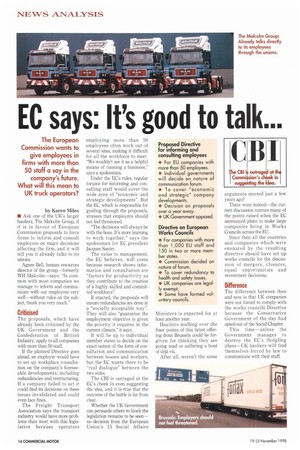EC says: It's good to talk...
Page 16

If you've noticed an error in this article please click here to report it so we can fix it.
The European Commission wants to give employees in firms with more than 50 staff a say in the company's future. What will this mean to UK truck operators?
by Karen Miles • Ask one of the UK's larger hauliers, The Malcolm Group, if it is in favour of European Commission proposals to force firms to inform and consult employees on major decisions affecting the firm, and it will tell you it already talks to its unions.
Agnes Bell, human resources director of the group—formerly WEI Malcolm—says: "In common with most companies we manage to inform and communicate with our employees very well—without rules on the subject, thank you very much."
Criticised
The proposals, which have already been criticised by the UK Government and the Confederation of British Industry, apply to all companies with more than 50 staff.
If the planned Directive goes ahead, an employer would have to set up workplace consultation on the company's foreseeable developments, including redundancies and restructuring. If a company failed to act it could find its decisions on these issues invalidated and could even face fines.
The Freight Transport Association says the transport industry would have more problems than most with this legislation because operators employing more than 50 employees often work out of several sites, making it difficult for all the workforce to meet. "We wouldn't see it as a helpful means of running a business," says a spokesman.
Under the EC's rules, regular forums for informing and consulting staff would cover the wide area of "economic and strategic developments". But the EC, which is responsible for guiding through the proposals, stresses that employers should not feel threatened.
"The decisions will always be with the boss. It's more learning to work together," says the spokesman for EC president Jacques Santer.
The value to management, the EC believes, will come because research shows information and consultation are "factors for productivity as they contribute to the creation of a highly skilled and committed workforce".
If enacted, the proposals will ensure redundancies are done in a "socially acceptable way". They will also "guarantee the employment objective is given the priority it requires in the current climate," it says.
It will be up to individual member states to decide on the exact nature of the form of consultation and communication between bosses and workers, but the EC wants there to be "real dialogue" between the two sides.
The CBI is outraged at the EC's cheek in even suggesting the idea, and it is true that the outcome of the battle is far from clear.
Whether the UK Government can persuade others to block the legislation remains to be seen— no decision from the European Union's 15 Social Affairs Ministers is expected for at least another year.
Hauliers mulling over the finer points of this latest offering from Brussels could be forgiven for thinking they are going mad or suffering a bout of déjà After all, weren't the same arguments mooted just a few years ago?
There were indeed—the current discussion mirrors many of the points raised when the EC announced plans to make large companies bring in Works Councils across the EU.
Since then all the countries and companies which were ensnared by the resulting directive should have set up works councils for the discussion of mergers, closures, equal opportunities and investment decisions.
Difference
The difference between then and now is that UK companies were not forced to comply with the works councils Directive because the Conservative Government of the day had opted out of the Social Chapter.
This time—unless the Government manages to destroy the EC's fledgling plans—UK hauliers will find themselves forced by law to communicate with their staff. Proposed Directive for informing and consulting employees • For EU companies with more than 50 employees.
• Individual governments will decide on nature of communication forum.
• To cover "economic and strategic" company developments. • Decision on proposals over a year away. • UK Government opposed.
Directive on European Works Councils • For companies with more than 1,000 EU staff and 150 in two or more member states.
• Commission decided on nature of forum.
• To cover redundancy to health and safety issues.
• UK companies are legally exempt. • Some have formed voluntary councils.
















































































































